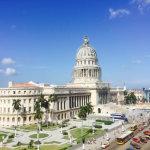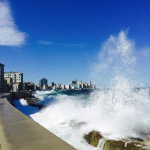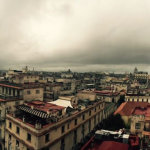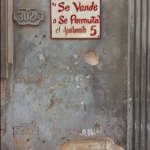
What is Londoño looking for?
HAVANA — A few days ago, Progreso Semanal published a photograph of a young man clad in sports clothes walking along the Paseo del Prado, looking athletic. He was Ernesto Londoño and the photo, taken from behind, was made by a Cuban journalist who identified him from a distance and thought how inspiring it was to see him walking the street like an ordinary citizen.
The stroller, a Colombian, is a new member of the editorial board of the most influential U.S. newspaper, The New York Times.
He has been the principal artificer of a succession of six editorials that the newspaper has published recently, in six successive weeks, to broach, with six different packages of arguments, a petition (we might even say “demand”) to the Obama administration to immediately begin “to end a long era of enmity” with Cuba.
After more than 50 years of hostile bilateral relations, this is an unprecedented act.
The NYT has described the blockade against Cuba as “senseless”; it has qualified as “impressive” the participation of Cuban doctors in the struggle against Ebola; it has censured the use of covert acts against Cuba, and has warned about “charlatans” and “swindlers” who profit from the U.S. dollars apportioned for internal subversion.
In its editorials, it has criticized the Congresspeople of Cuban origin who “continue to anchor American policy on a failed course that has strained Washington’s relationship with allies in the hemisphere,” and it has proposed to loosen the obstacles by means of an exchange of Alan Gross for the three Cubans from the group of The Five who have been imprisoned in the U.S. for more than 16 years.
Finally, it has given lessons in ethics to the U.S. government: “There is much to criticize about Washington’s failed policies toward Cuba and the embargo it has imposed on the island for decades. But the Cuban Medical Professional Parole Program, which in the last fiscal year enabled 1,278 Cubans to defect while on overseas assignments, a record number, is particularly hard to justify.”
And there’s still people who claim to be puzzled about the interest generated by Londoño’s visit to Cuba!
That perplexity, forced and a bit phony, from one side and the other, tries to ignore that Londoño is not just another reporter. He hasn’t come here to spend a vacation or claim tribute from the Cuban government.
He is in Cuba, as he has stated, because there will be more editorials. “At first, the idea was to run just one editorial, but the reaction was very interesting and we decided to give it continuity,” Londoño told OnCuba.
Although he also disparaged the idea that some lobby was “pushing” the topic on the newspaper and focused it as a mere exercise “to attract more readers outside the United States,” anyone could suppose that The NYT wishes to clear the way so that U.S. public opinion will more comfortably accept possible actions by the Executive, with or without the blessing of a very Republican Congress, same as happened recently with the issue of immigration.
Although improved relations are matters with diverse weight and distinct importance in the United States’ political actuality, Obama has been called to take some action with relation to Cuba before April 2015, when the Summit of the Americas will be held. All the Latin American countries that will gather in Panama are expectant.
Only two days after arriving in Havana, Londoño made statements on Spain’s Ser network in which he explained why this is the right time to keep editorializing on the issue of Cuba.
“You can’t ignore the reality that there is going to be a rapprochement — at least diplomatic — regarding Cuba,” he said. “This is a good opportunity to reevaluate, to look for a more sensible position and see if there might be points on which we could negotiate.”
To do this, what arguments could The NYT continue to introduce, so as to review the “Cuban problem” from another point of view and thereby make viable a new focusing of policy?
Many eyes have turned toward Londoño in recent days. They all try to identify what he’s looking at. What captures his interest? What moves him? What does he approve of? What repels him? What does he discover? What seduces him? What annoys him?
Although he hasn’t arrived with an empty suitcase, he has shown interest on not giving anything for granted. A priori, his observation “script” does not seem hostile, although you can’t expect him to imitate a militant communist.
From his Twitter account (@londonoe), he has dropped a trail of bread crumbs, a record of his travels. A few hours after arriving, he visited the offices of the newspaper Granma. Days went by before the newspaper related what happened.
“We had an interesting chat today with the personnel of Granma, the newspaper of the Communist Party of Cuba,” Londoño tweeted immediately thereafter.
“It was a diaphanous dialogue, although it’s known that conversations among journalists are always accompanied by the kind of personal thermometer — or instinct, however you want to call it — with which we’re constantly trying to evaluate our interlocutor,” wrote Karina Marrón, Granma’s deputy director.
Londoño also visited the “impressive” offices of OnCuba on a ninth floor, overlooking the sea. His attention was drawn to a large portrait of Obama that he saw there. According to Fernando Ravsberg, when Londoño asked what the United States should to to help Cuba, the young journalists responded, “nothing.” The U.S. should not get involved in anything, they said.
Yesterday, Londoño met with Randy Alonso, Rosa Miriam Elizalde and the Cubadebate team. An entry in Cubadebate’s Twitter account said: “A frank exchange today with @londonoe on his visit to @cubadebate.”
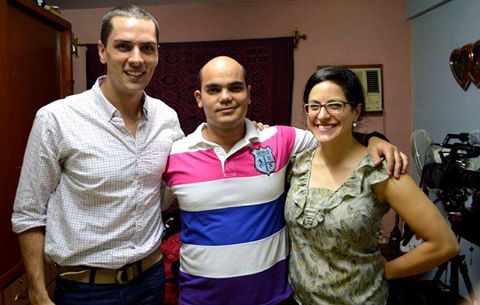
Londoño has also talked twice with the Cuban blogger of the “chirileaks,” Carlos Alberto Pérez, of La Chiringa de Cuba, a worker in the Joven Club and a persistent critic of bureaucracy, with an emphasis on ETECSA. The second time, they met at Pérez’s house and Londoño brought along a NYT photographer.
Over the weekend, he spent some two hours with Yoani Sánchez and her clique of close collaborators. An account of that meeting, in the blog “14ymedio,” is — as we say in Cuban — “a poem.” Londoño refused to be photographed and warned that nothing he said could be published, according to one of the participants in that encounter, held at the Hotel Saratoga.
Londoño excused himself, saying that he had to ask for authorization to grant interviews. One can’t help thinking that there’s something unusual about that behavior.
Perhaps he’s protecting himself from interference that could be catastrophic for his later intentions. At one point, I thought it might be an agreement between the parties, so that the monologue delivered by Yoani’s team could become the central speech and gain visibility as it lifted off the Londoño aircraft carrier.
But even that theory is doubtful, if one reads the miffed description by Miriam Celaya, who was there: “It had become a ‘clandestine’ appointment with a taste of adultery, a kind of media conspiracy intended to nourish and diversify [his] knowledge of Cuba’s reality, but not allowing us to divulge his points of view, his motivations about our country, or the target of his interest.”
The memorandum in “14ymedio” of what was said is a torrent of criticism of the Cuban government, with two predominant messages. First: In Cuba there are no changes; they are only cosmetic. Second: We don’t like the “embargo,” but don’t lift it unless it imposes conditions on Havana. Both stances contradict some of the theories of The NYT.
We shouldn’t be surprised when the majority of Cuba’s informed population welcomes the editorials for representing an access door to a new possible regimen of bilateral relations, while the dissidents describe them as “almost perverse.”
To the best of our knowledge, Londoño has not had other meetings with members of other dissident organizations. And although the Foreign Ministry’s International Press Center is facilitating his access to various places, he has not had public contact with government officials.
Apparently, he is mostly interested in learning first-hand the discourse of the communicators (professional or amateur) who are also opinion givers.
Londoño is harvesting shadings.
It is very likely that the next topics of these bilingual editorials (also directed at the Cuban reader on the island and abroad, and at Latin American readers) are already pre-defined. Considering that the main interlocutor for these articles is the U.S. government, what will future editorials deal with?
Soon, we might very well see references to the gradual changes in the communications system in Cuba, in particular to the press system; the broadening of limits to freedom of expression and the consequent benefit for human rights.
Londoño has surely noticed the impact of some “alternative” digital publications and will point out the role of Cuban bloggers who, like Carlos Alberto Pérez or Paquito el de Cuba, have contributed to diversify the voices and the focuses on topics that used to be strongly censored.
It is likely that he will mention the reconfiguration of the control over the media, increasingly less centralized, and the phenomenon of the Weekly Package. All this pushes forward a civil society that is enjoying more possibilities for articulation and presence.
Connectivity to the Internet from Cuba could also interest him. I’m pretty sure that The NYT will tell Obama the same that Eric Schmidt, Google’s president, said after his visit to Havana: If you don’t hurry (you, in the government), we’ll get there late (we, in business.)
Besides, the Internet is an “opportunity” for “the world to open to Cuba and Cuba to open to the world,” as John Paul II asked, in a clear vision to which the successive U.S. administrations, from 1998 till today, paid little attention.
The truth is that Washington has maintained, for decades, the policy of hampering Cuba’s access to the webs, while insisting on turning that space into a battlefield in the purest and harshest Cold War style through covert operations and the promotion of subversive actions. The policy of isolation is unnatural in a world that’s reticular and fluid.
If there were any willingness by the U.S. to legally facilitate connectivity for the transmission of voice and data at unsanctioned prices, Cuba would have to react. Could the current status of such low connectivity (only 25 percent, according to official figures) be maintained in the country?
That would be like handing a hot potato to the authorities on the island, who would have clarify even further their policy regarding the access to webs, and to propitiate a broader coverage.
Because Londoño was in Havana at the time that the young people of Semester at Sea arrived, I suppose that he’ll be inspired by the vision of those youngsters in a country that welcomes them with affection and safety. I imagine he could use them as an example to argue that a more fluid people-to-people relationship would be infinitely valuable for all.
Obama knows it already, but surely Londoño will find new ways to tell him that Americans should have absolutely no restriction or obligation to ask for permission to travel to Cuba as often as they want. In the past, the Cuban government gave and took back those permits, but that sad era is behind us.
What do U.S. citizens need to see their rights of free mobility recognized? Londoño could say in his report that Cuba is a very adequate place to spend a vacation, along with 2 or 3 million compatriots who would come with him every winter to take advantage of the warm weather.
I suppose that another topic that The NYT will find interesting is the promotion of a market economy in Cuba. Because the Great Nation, since its birth, has used faith in the market as a social regulator and freedom of enterprise as a supreme guarantee, we cannot understand how it does nothing legal, in full light of day and without ulterior motives, to allow the market to advance in Cuba; to allow business and the new cooperatives to find partners with capital, technology and markets to invest in large or small projects.
All these, together, could contribute to improve the standards of productivity, consumption and redistribution of wealth that, if well organized, would improve the lives not of government but of the ordinary folks who Londoño is meeting at every step in Havana, Pinar del Río, etc.
If Americans don’t like a state-run economy, why don’t they engage with the emerging small businessment known as “cuentapropistas” [self-employed entrepreneurs]? Maybe Obama will decide to stop harassing foreign banks that do business in Cuba, or to create a special fund for the development of small and mid-size businesses on the island, or one that promotes investment by Cuban-Americans (Cuba’s new Law on Foreign Investment would allow it.)
The list of initiatives could be a lot longer. What can be said about the absurd slowness in assimilating Heberprot-P as a useful therapy for the more than 20 million diabetes patients in the U.S.? Why not imagine the attractiveness of a Cuban market that at present imports about 80 percent of the foods it consumes? Imagine the benefits for Florida, the third poorest state of the Union, with the creation of new jobs focused on the creation of consumer goods and services for the island.
I am assuming that The NYT is not much concerned over Cuba’s sovereignty, something that, for the newspaper, is not under discussion. That’s a subject for the Cuban side to deal with.
Those who know say that, in politics, the most important things are unseen. But the contemporary dynamics is increasingly dependent on the front pages of newspapers, television screens and memes in social networks.
That is why we shouldn’t underestimate the relevance of the agenda carried by The NYT, an agenda that Londoño has come to spice with images of a reality that has been kept in the dark for the greater public of the United States for decades.
The NYT is not alone. It is part of a system of interests ever more visible, stimulated by the starter’s shot fired by Obama in November 2013 when he said in Miami that it was time to change the old policy.
Every once in a while, we need to look in the direction they’re looking, to find out where the new roads will lead us.
The six bilingual editorials about Cuba are:
Obama should end the embargo on Cuba (Oct. 11, 2014)
Cuba’s impressive role on Ebola (Oct. 19, 2014)
The shifting policies of Cuba policy (Oct. 25, 2014)
A prisoner swap with Cuba (Nov. 2, 2014)
Misadventures in regime change (Nov. 9, 2014)
A Cuban brain drain, courtesy of the U.S. (Nov. 16, 2014)
Photos: Ernesto Londoño. From his account in Twitter (@londonoe)


